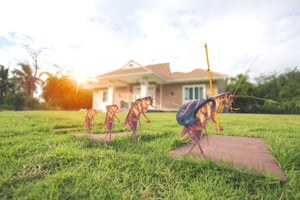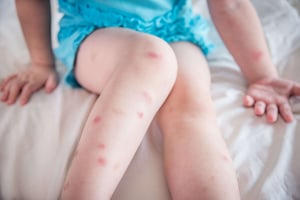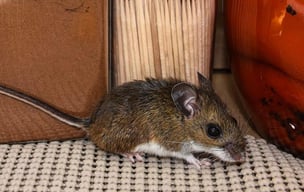Four Household Pests and How to Control Them
Pest control is necessary because nobody wants to endure the damage that pests cause. These unwanted animals crawl on food items and spread germs causing health issues that are sometimes deadly. Some destroy homes and commercial premises, while others threaten human activities such as agriculture. In this post, we shall discuss some of the most irritating household pests and how to control them.
Cockroaches
A female roach produces an egg case which it carries or leaves in a warm, dark place until hatching. The nymphs develop into adult cockroaches after several molting processes. Depending on the species, it can take up to 12 months for larvae to reach maturity.
Since cockroaches live and breed in rubbish, they carry a lot of disease-causing organisms on their bodies. They transmit the germs to humans when they come into contact with food and cooking equipment. Some of the diseases they spread include shigellosis, Hepatitis A, gastroenteritis, and salmonellosis.
Hygiene is the primary method of keeping cockroaches at bay. To prevent contamination, store food in containers with tight lids and keep utensils and food-handling items off the floor. The bugs hide in cracks and crevices, so filling them can help. Eliminate food particles by cleaning the shelves and cupboards regularly.
If you have an infestation, ask a cockroach exterminator for assistance. The specialist can administer a low toxicity insecticide on areas where roaches hide such as cracks and behind fridges and stoves. Before fumigation, clean inside and around your property thoroughly to reduce the food supply for the bugs.
Flies
Flies thrive in the dirt. They lay their eggs in dump organic matter such as dead animals, grass, animal droppings, and food remnants. Some species mature in about seven days. They serve an essential ecological role of a food source for other animals as well as pollination. However, a fly infestation can be tragic.
When the insects land on grimy material like feces or carcasses, they carry disease-causing microbes on their legs and hairy bodies. They transfer the germs to utensils and food, potentially making people ill. If you notice a lot of flies in your home, there could be a favorable breeding ground for them around.
Flies are vectors of several ailments, including food poisoning, trachoma, dysentery, typhoid, rotavirus, and cholera. They can also cause financial losses after contaminating food products. Additionally, their presence in business premises can give customers the impression of insanitation.
The best way to keep flies away is to eliminate their breeding grounds. Wrap food scraps and other household trash and keep it in a bin with a tight-fitting lid. Be sure to empty the container at least once a week. Keep your toilet clean and ensure that the vent pipes have fly-proofing. If you have pets, remove their feces daily.
Mosquitoes
 A mosquito's mouth has a sharp end for piercing its host. For a female mosquito to lay healthy eggs, it requires to feed on human blood. The insect transmits several diseases among humans and animals. Their itchy bites are also annoying.
A mosquito's mouth has a sharp end for piercing its host. For a female mosquito to lay healthy eggs, it requires to feed on human blood. The insect transmits several diseases among humans and animals. Their itchy bites are also annoying.
Mosquitoes lay their eggs on the surface of stagnant water. They also breed in moist areas such as grass blades or mud next to a water source. If it's too dry, the eggs stay dormant until the conditions become favorable. Larvae (wrigglers) hatch and feed on organic material in the water. The wrigglers become pupae before developing into adult mosquitoes.
If a mosquito bites a person infected with some disease, it can carry the pathogens and transmit them to the next person it pricks. The cycle can get repeated and result in a disease outbreak. Mosquitoes are responsible for spreading some of the deadliest diseases across the globe. Examples include dengue fever, malaria, chikungunya, Barmah Forest virus disease, elephantiasis, and more.
To control mosquitoes, eliminate their breeding sites. Drain standing water and get rid of unnecessary containers in the yard. Clear your gutters and drains and cover your tanks and leach drains with fitting lids. Fix any leaking taps and pipes.
Rodents
Rodents are warm-blooded animals such as mice and rats that scavenge in and around homes.
They live in rubbish pits, sewers, drains, and other dirty areas. The pests collect disease-causing organisms and spread them to humans when they enter homes. In the 14th century, rat fleas spread the bubonic plague, which claimed about 25 million lives in Europe and Asia.
areas. The pests collect disease-causing organisms and spread them to humans when they enter homes. In the 14th century, rat fleas spread the bubonic plague, which claimed about 25 million lives in Europe and Asia.
Rodents spread disease through bites and food contamination. Some of the ailments they transmit include salmonellosis, rat-bite fever, and leptospirosis. Besides ailments, rats and mice eat large amounts of grains stored in silos and destroy homes and clothes.
Hygiene can help to keep rodents away. You can also install door and window screens or set traps and poison baits.
Final Thought
Pests are a nuisance, but you can eradicate them with the tips described in this post. If you have an overwhelming pest problem in your Texas home, consult a specialist for pest control in Dallas.
Pest Prevention is the key to controlling pest in and around your home. It is cheaper and easier to keep them out than to get them out.










